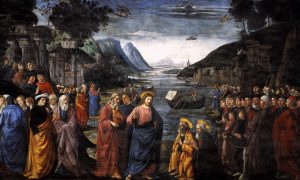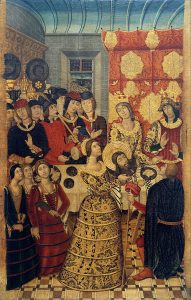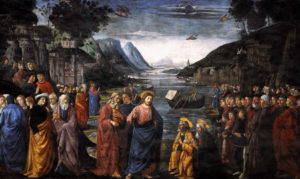Thoughts on Sunday’s Lessons for July 7, 2024

Jesus commissioning the Twelve Apostles (1481), fresco by Domenico Ghirlandaio (1449-1494). Sistine Chapel, Vatican City, Rome. (Click image to enlarge.)
First Reading (Track One): 2 Samuel 5:1-5, 9-10
David has mourned the deaths of King Saul and Saul’s son Jonathan, David’s beloved friend. Now in Sunday’s Track One first reading, all the tribes and elders call David to be formally anointed king over all Israel.That includes both the Northern Kingdom with its capital at Hebron, and Judah, the Southern Kingdom, where Jerusalem is the capital. The elders, who had sworn fealty to Saul, now pledge loyalty to David, recognizing that God has called him to be shepherd over Israel. David would reign for 40 years, becoming greater and greater and earning for Jerusalem the title “City of David.”
First Reading (Track Two): Ezekiel 2:1-5
It’s frustrating when we have something to say, but people won’t listen. It doesn’t feel good, does it? Hold this thought as we hear Sunday’s Track Two readings, as each connects in some way with this spiritual challenge. In our Track Two first reading, God calls Ezekiel to be a prophet to Israel. God is not pleased with the people, telling Ezekiel that they are a nation of rebels who have rebelled against God: an impudent and stubborn people whose ancestors and they themselves continue transgressing against God. These rebellious people may choose to hear or not to hear, God tells Ezekiel, but he is to deliver God’s message of lamentation and mourning and woe.
Psalm (Track One): Psalm 48
Psalm 48 offers a spiritual understanding of the founding narrative of Israel’s kingdom in Jerusalem, where the first temple would be built atop Zion, God’s holy mountain. The Psalmist sings praise to the greatness of God, who placed the city of the great king on the lofty hill of Zion, the very center of the world. Let the kings of the earth who might march on Zion in hope of conquest look and be astounded, the Psalmist sings. Let them writhe and tremble and run away, for God has established this citadel forever.
Psalm (Track Two): Psalm 123
Traditionally understood as a “song of ascent” to be chanted as the priests and people go up to the Temple in formal procession, Psalm 123 calls on a merciful God to hear the peoples’ prayer. They who have suffered the contempt, scorn and derision of the indolent rich and the proud now lift up their eyes to God enthroned in the heavens. They pray that God will show them mercy, for they have had more than enough of contempt.
Second Reading: 2 Corinthians 12:2-10
These verses from 2 Corinthians are full of mysteries! Even bible historians and theologians aren’t sure what Paul means about the “third heaven” or the “thorn” that troubles him but that he does not describe. Perhaps the third heaven describes Paul’s own spiritual experience, and the thorn, Scripture scholars speculate, could be an unnamed illness or disability, or even a sexual temptation. In any case, there is no ambiguity in Paul’s conclusion: Through prayer and reliance on God’s grace through Christ, we can endure hardships that come from within and without.
Gospel: Mark 6:1-13
Jesus’s hometown neighbors and friends aren’t impressed with him. Oh, they were astounded at first by his teaching and preaching in the synagogue, his wisdom and deeds of power. But then they remember that this is nobody but just Jesus, the carpenter’s son! What makes him so high and mighty? Amazed by their unbelief, in Mark’s telling, Jesus responded: prophets are not without honor except in their home town. Then Jesus sends out his followers, two by two, to tell the good news, but he warns them to expect more of the same kind of pushback. Don’t dress up, he told them. Don’t act special. If people won’t welcome you, move on down the road.



